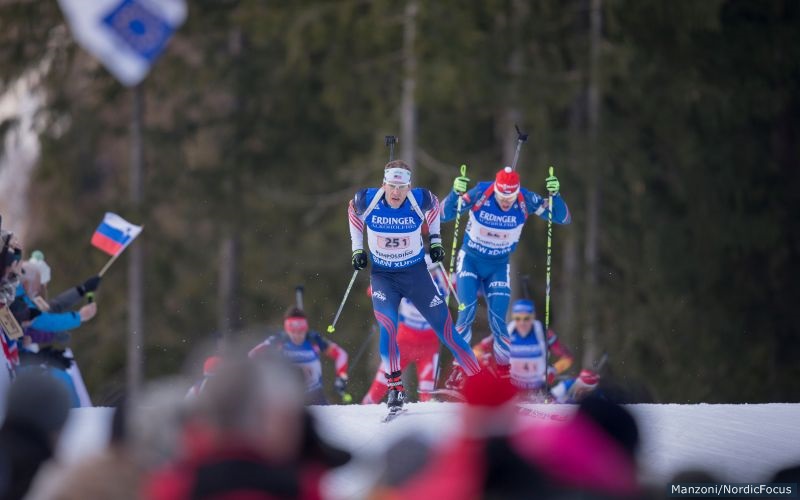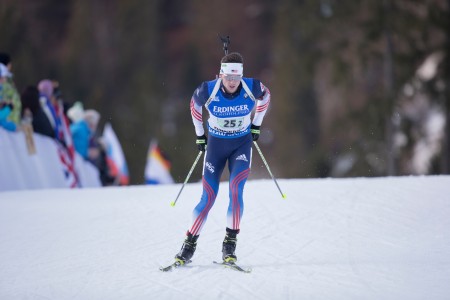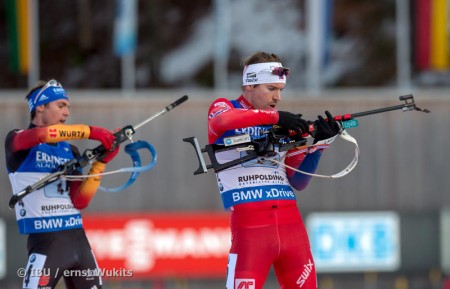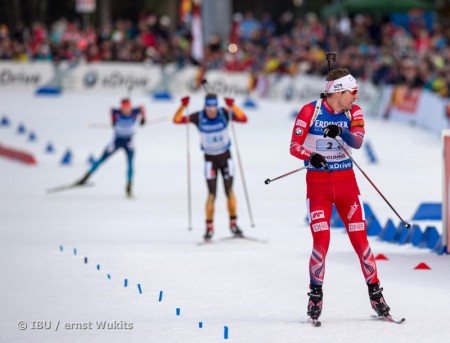
Emil Hegle Svendsen and Lowell Bailey had a few things in common on Thursday, despite not racing head to head in the men’s 4 x 7.5-kilometer relay in Ruhpolding, Germany. While Bailey started the four-leg race for the Americans in last of 25 teams and Svendsen anchored the Norwegians after starting in the top two, both led to the finish and capitalized on one critical hill to do so.
Bailey saw his opportunity on his last of three laps, after moving up from dead last in the mass start (where his team was seeded after missing last week’s IBU World Cup relay in Oberhof, Germany) and cleaning both his prone and standing stages to move into fifth.
Three seconds behind Norwegian race leader Ole Einar Bjørndalen at 6.1 k, Bailey latched onto the back of a chase pack two seconds behind Bjørndalen, with Michal Krcmar of the Czech Republic, Germany’s Erik Lesser and Bulgaria’s Krasimir Anev.
On the phone Thursday, Bailey said that he knew Lesser’s strengths — he has a strong finishing kick and is a “great tactician [who] knows when to tuck in behind people and when to push it.”
By clinging to the German, Bailey found himself in the top four and overtaking Bjørndalen. With three climbs remaining, the American anticipated Lesser’s next move: a push on the first big uphill. He was right; Lesser attacked and Bailey was able to stay with him and move into the top three.
“Then basically we were all in a line and everyone on that second-to-last hill went right,” Bailey recalled. That was the shortest line into the righthand curve at the top, but he saw an opening on the left and went for it.
“I put in a sprint there, which put me into the lead,” Bailey said.
At 6.4 k, with just over a kilometer to go, Bailey was up front, 0.3 seconds ahead of Bjørndalen and 1 second ahead of Krcmar.
“For the last hill, I just tried to give everything I had,” Bailey explained. “I pretty much knew if I could stay into the lead over the top of the last hill, I could keep a lead going into the stadium.”
Just as he’d hoped, the American stayed ahead on the long descent and straightaway into the exchange zone. He tagged Sean Doherty in first, 0.5 seconds ahead of the Czech Republic in second, 3.2 seconds ahead of Russia in third, and 3.7 seconds ahead of Norway and Germany.
“Any second or two advantage I could give to Sean is a second or two that he doesn’t have to make up,” Bailey explained. “I was just trying to key in on where he was and get him into a good spot … I didn’t know what was going to happen with Sean, being that this is his first time on the World Cup this year and definitely one of his first times getting tagged off in that first group, but he handled himself well. He stayed really relaxed and stayed right with it … and he did a great job.”

In his first World Cup of the season, Doherty, 19, grinned while looking back at Bailey.
“When Lowell was coming in, all I could do was smile, really,” Doherty said in a US Biathlon press release. “In front of one of the biggest and most exciting crowds of the year, to have the lead, these are the moments that you train all summer for — the position that I want to be in, even if it was a bit surprising.”
Not long after, Slovenia’s Jakov Fak took the lead after receiving the tag in sixth, 4.3 seconds behind Doherty. Russia’s Timofey Lapshin, Germany’s Andreas Birnbacher and Fak all entered the range together for their first stage, and Doherty followed less than a second back in fourth.
Fak cleaned to leave first, 4.4 seconds ahead of Norway’s Erlend Bjøntegaard in second and 5 seconds ahead of France’s Simon Desthieux in third, both of which also cleaned. Doherty used all three spares but avoided a penalty loop, setting out on his second lap in eighth, 27 seconds after Fak.
“For the first prone, it was a little rough,” Doherty recalled. “But the key is to forget that and reset for the next stage. I had super skis and just focused on keeping a good pace on the course, then to come into the range and let the training take over and skip the spares this time.”
He did so on the next round, cleaning standing to move into sixth, 36.9 seconds behind Fak in first and 0.3 seconds back from Czech Michal Slesingr in seventh. Fak cleaned his second-straight stage quickly to stay 10.6 seconds ahead of Birnbacher, who cleaned as well to move into second.
By the second exchange, Fak tagged teammate Rok Trsan in first with a 23.4-second gap to Norway in second and 23.7 seconds to Germany in third.
Doherty handed off to U.S. teammate Leif Nordgren in sixth, 59.1 seconds behind Slovenia and 9.3 seconds behind the Czech Republic in seventh.
After arriving in Ruhpolding two days earlier, Nordgren was still coming off a cold he’d been battling since the beginning of the month.
“I was hoping it wasn’t going to be much, in fact I never really felt too bad physically, but it’s just taken a long time to clear out of my sinuses and lungs,” he explained in an email.
Instead of racing in Oberhof, he recovered at home and explained that Thursday marked his first hard effort in almost two weeks.
Before his first shooting, Nordgren slipped one spot to seventh behind Austria. He entered the range 52 seconds behind Slovenia in first, and proceeded to miss three — using all three spares.
That put Nordgren in ninth and then 10th on the next lap. Heading into the second stage, he was 1:27.6 behind Germany’s Arnd Peiffer, who cleaned prone to take the lead, just ahead of Trsan, who used one spare.
Nordgren hit all five standing targets without a miss, improving to eighth and 1:18 back. Peiffer used one spare but stayed in first, eight seconds ahead of Norway’s Johannes Thingnes Bø in second, who had more trouble shooting with one prone spare and three spares in standing.
“My goal for today was more for the shooting,” Nordgren explained. “I wasn’t sure how the ski shape was going to be, so I was mostly focused on making sure I do a normal shooting routine. I wasn’t happy with prone obviously, but standing it came around and all in all I’m not too disappointed.”
While Peiffer led Bø into the last exchange, with just a second separating the two, and 28 seconds to Russia in third, Nordgren tagged Tim Burke ninth, 1:51.8 back but 0.2 seconds behind Slovakia.
Burke was also recovering from an illness he came down with last week. In an email, he explained he had not trained much in the five days before the relay.
“I would have liked a few more days to recover before racing again but we really needed to start the relay after skipping last week,” he wrote. “It was definitely a shock to my body to start racing and, as expected, I felt very flat.”
Burke remained in ninth until his first shooting, which he cleaned to improve to eighth, 2:04.9 behind the leaders. He went on to use three spares in standing, dropping to 11th and 3:05.2 back.
While Burke posted the seventh-fastest course time of the anchors on the last lap, he managed to pick off just one place to put the U.S. in 10th at the finish, 2:55.3 out of first.
“Today was definitely a challenge for me but overall I think it was positive for the team,” Burke wrote. “Using three extra rounds at this level is simply not good enough.”
In the final shooting, Canada moved ahead of the U.S. for the first time in the race. Nathan Smith cleaned prone, then used two standing spares to leave the range 3.5 seconds ahead of Burke in 10th.
“I was able to catch up and pass him, but I did not have enough gas to reach the finish,” Burke wrote.
The Canadians placed ninth, 2:53.9 back and 1.4 seconds ahead of the U.S.
“I was pretty worried with Tim breathing down my neck the whole lap,” Smith wrote in an email. “He attacked on the first big climb but I think that cost him later on. He was also sick last week so that probably helped to my advantage. On the last climb the [Belarusian] put in a very surprising attack and I couldn’t really answer. I clawed back most of those metres in the final strait but couldn’t quite do it.”
Yuryi Liadov edged Smith by 0.3 seconds for eighth.
“Since the course was quite icy and fast, I picked up most of my time in the range,” Smith noted. “Although perhaps the actual places were grabbed out on course. My skiing was good. About on par for this season. I’m happy with that but obviously I’m looking for an amazing day or two this weekend.”

While the North Americans duked it out for a top 10, Norway’s Svendsen and Germany’s Simon Schempp switched leads at the front of the pack. Both used one spare in prone, as did Russia’s Anton Shipulin, but the two stayed 20 seconds ahead of Russia in third.
In the final stage, Schempp cleaned to leave the range 7.4 seconds ahead of Svendsen, but the Norwegian caught him a kilometer later.
Shipulin came within 10 seconds of the two leaders about 1 k before the finish, but that was where Svendsen turned it on — attacking on the same last climb before the stadium, just like Bailey.
Svendsen passed Schempp before the top and left him several meters behind while soaring down into the finish. He sealed the win for Norway by 4.6 seconds in 1:09:42.3, and Schempp held off Shipulin by 3.8 seconds for second place.
“I was not sure that I would catch a strong athlete like Simon,” Svendsen told the IBU. “It took a lot of energy to catch up, so I stayed behind him to recover some. I knew that I am good in turns so I waited to one of the last turns before the bridge. I think my plan worked pretty well.”

Shipulin and the rest of the Russian team, which won last week’s relay in Oberhof, settled for third (+8.4). France took fourth (+23.8), ahead of Austria in fifth (+24.5), and the Czech Republic in sixth (+30.8).
More than two minutes later, Slovenia’s Janez Maric, who had two penalties and three spares, finished seventh (+2:46.8), Belarus was eighth (+2:53.6), Canada ninth, and U.S. 10th.
“We hope for the flower ceremony and a podium, but there’s been a lot of things leading up to this race definitely didn’t go in our favor,” Bailey said. “We definitely weren’t, as a team, at a hundred percent, so considering that we’re pretty happy with a top 10. It’s definitely better than the 25th rank that we had starting today.”
Canadians Improve from 15th to Ninth
With the Gow brothers entering their second World Cup weekend (after starting on the IBU Cup circuit) and Brendan Green back for his first race since the holiday break, the Canadians were somewhat of an unknown for Thursday’s relay.
However, a week ago, they placed eighth with two IBU Cup skiers — Christian Gow and Macx Davies — plus Marc-André Bédard and Smith.
“I would say our goal was to build on our relay performances from the season so far and with solid racing, discover what is possible,” Green wrote in an email on Thursday.
He arrived in Ruhpolding on Monday night after training in Canmore, Alberta, over the holidays.
“I feel as though I was able to bring better focus into a few aspects of my performance and hopefully that will show during this trimester,” Green explained of his training.
He skied the second leg for Canada, receiving the tag from Christian Gow in 15th and 59.2 seconds behind the leader. Gow posted the 15th fastest-course time of the first leg and used one spare in each of his two stages.
“During my leg of the relay I was hoping to move up the ranking a bit and keep the team in the race,” Green wrote after skiing up to 13th with 10-for-10 shooting.
“I’m for sure happy with my shooting today but my skiing was not as strong as it should be,” he added, after skiing the 12th-fastest course time of the second leg. “Maybe partially to jet lag, who knows.”
He tagged Christian’s older brother, Scott Gow, in 13th, 1:53.7 out of first. In his first World Cup relay of the season, Scott used three spares in prone and two in standing to slip to 15th, where he remained until the final exchange.
“It was a pretty tight field and I knew strong shooting would move us up there,” he wrote in an email. “Unfortunately I couldn’t keep myself together very well on the range … Shooting was bad today. I don’t have any excuses other than I was inside my own head too much, and just need to relax and not worry about my competitors when I’m on the shooting mat.
“I was a little anxious going into both prone and standing shooting because I wanted to hit all 5 quickly and get out of there. Ideally I would focus on the process and not trying to destroy my competitors. I’ll try harder for Saturday.”
Scott plans to race the remaining World Cup competitions in Ruhpolding this weekend and Antholz, Italy, next weekend.
“My goal for this season was to race mainly on the World Cup circuit, so I am happy to be starting here in Ruhpolding,” he wrote, explaining he arrived in Europe on Sunday. “If I can maintain good results and good form I should be able to stay on the circuit.”
Scott tagged Smith in 15th, 2:50.8 behind the leader and 11.6 seconds behind Belarus in 14th.
“I knew I was losing time on the leaders, so my goal was to try and bridge the gap to my closest competitors and give Nathan the best chance possible,” Scott added. “I’d like to think I made up some time on my last loop but it wasn’t as much as I would have liked. I’m happy with my race today but have a few things to focus on for the sprint race.”
According to Smith, the position was “not great but not a disaster yet,” he wrote. “I knew if I put in a really good leg I could move us back up to perhaps around 10th.”
Considering how fast and icy it was, he knew ski speed wasn’t going to make the difference — shooting would.
“Prone went amazingly well and I built on that through the race,” Smith wrote of his clean first stage.
He tried to be as precise in standing, but lost some focus on his final two shots, he explained.
“I would say we are satisfied with today but we are still capable of more,” Green summarized of the team’s ninth-place finish.
“The conditions today were probably the best we’ve had all year. Basically no wind, pleasant temperatures, and firm tracks,” Smith added. “I wouldn’t have minded a little less ice, but I’ll take that over what the women had to race in yesterday. It looked so slow.”
Bailey said it was the best conditions he’d seen all year as well, with perfect tracks, transformed snow, and not much wind.
“Much different than Oberhof,” he said.
Alex Kochon
Alex Kochon (alexkochon@gmail.com) is a former FasterSkier editor and roving reporter who never really lost touch with the nordic scene. A freelance writer, editor, and outdoor-loving mom of two, she lives in northeastern New York and enjoys adventuring in the Adirondacks. She shares her passion for sports and recreation as the co-founder of "Ride On! Mountain Bike Trail Guide" and a sales and content contributor at Curated.com. When she's not skiing or chasing her kids around, Alex assists authors as a production and marketing coordinator for iPub Global Connection.




One comment
nyctvt
January 16, 2015 at 7:52 pm
Sean’s smile – priceless!